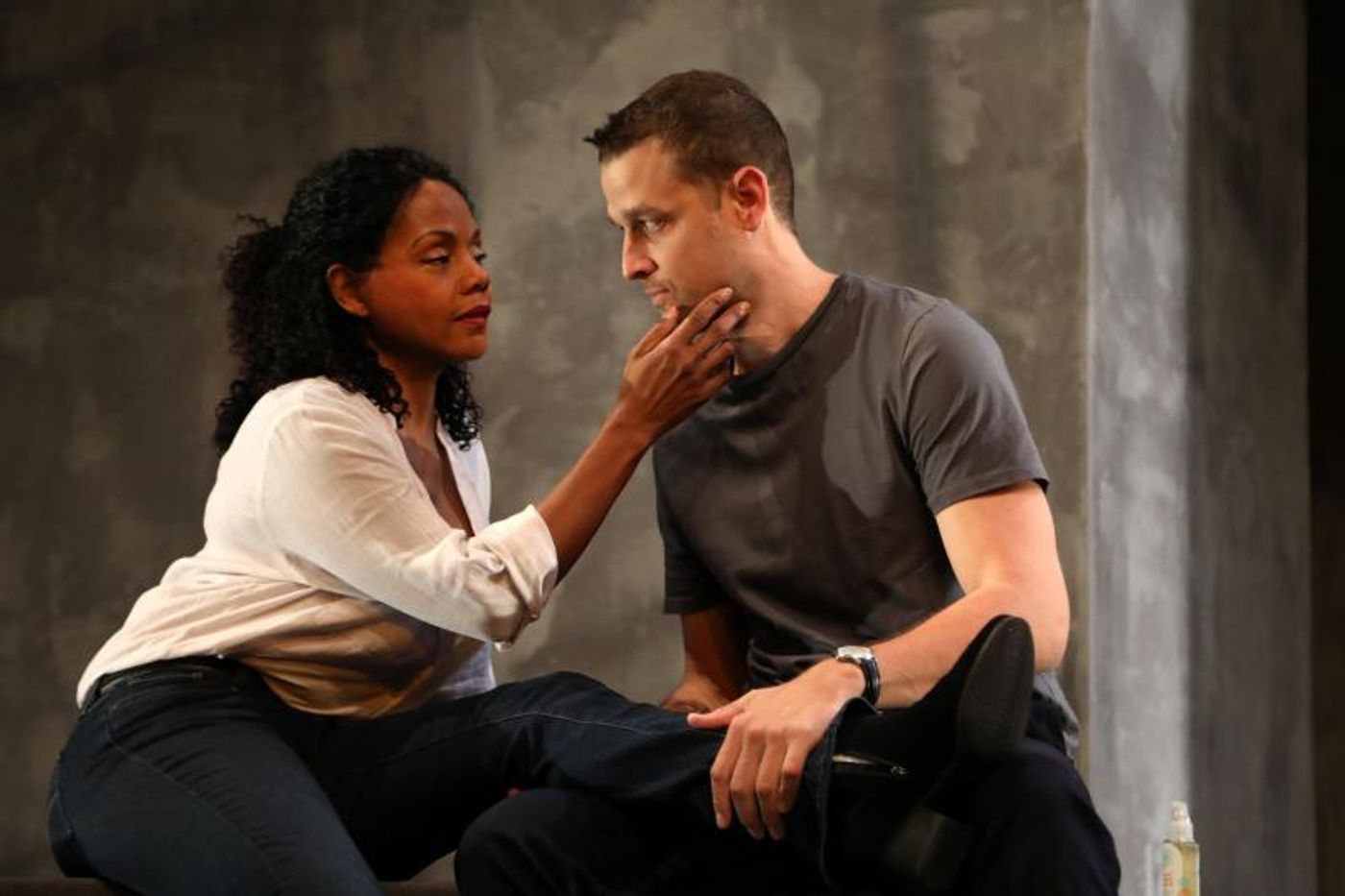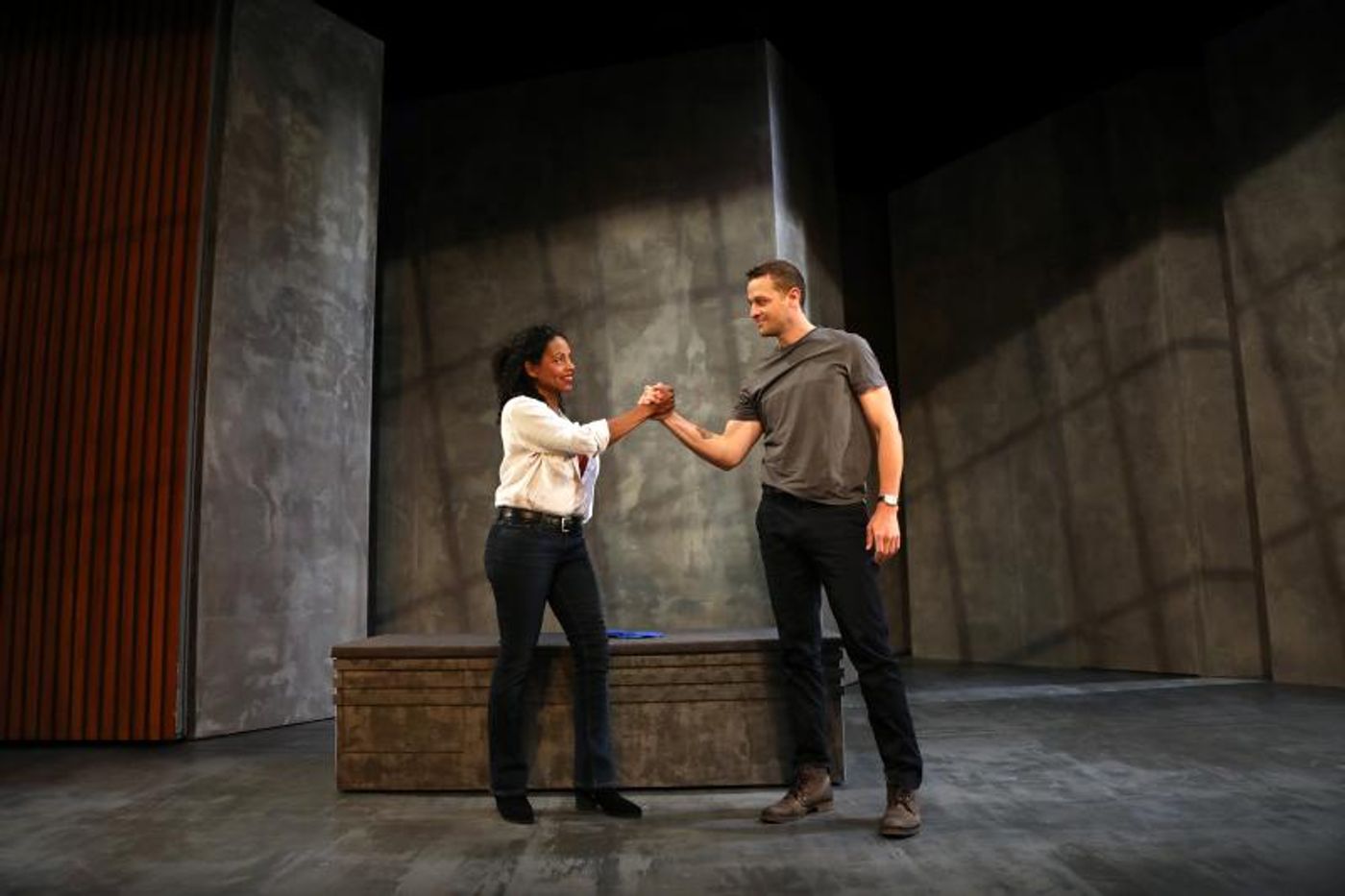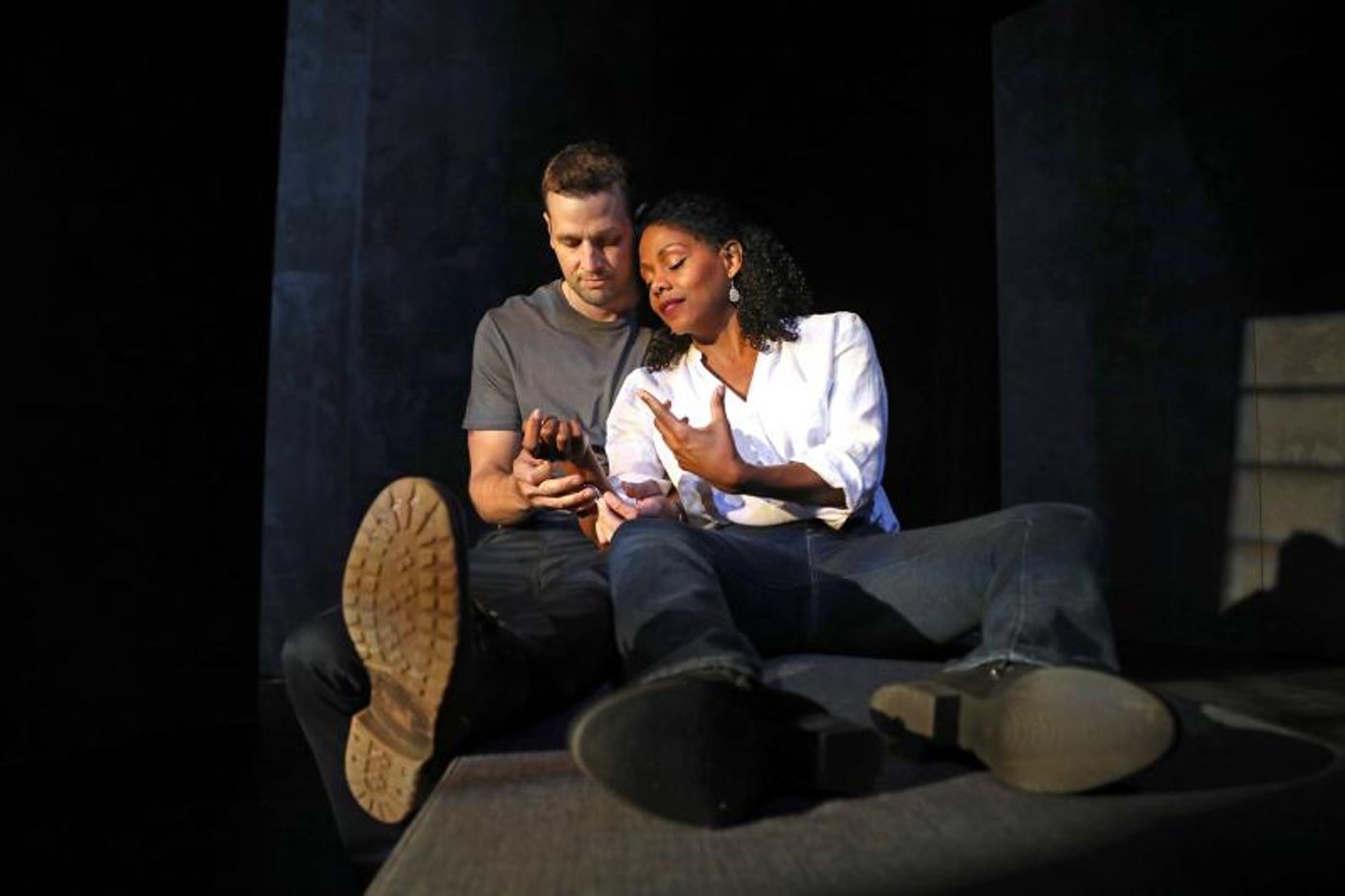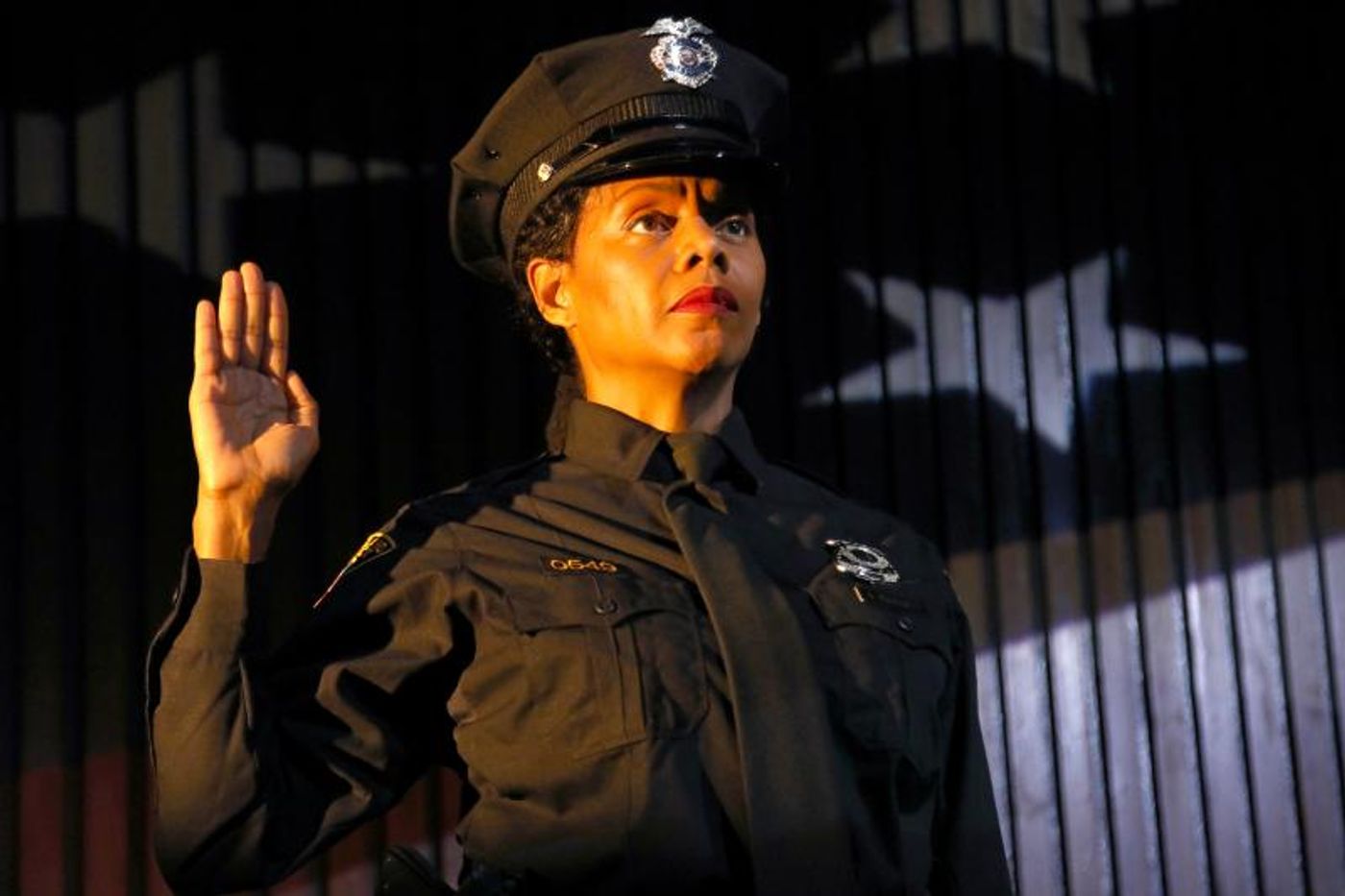Review: Riveting New Play SHEEPDOG Has Impressive World Premiere at South Coast Repertory
More frequently than it ever, ever should be, we continue to unfortunately live in a time when you can't seem to turn on the news or read a posted article on social media without hearing about yet another heartbreaking story of a young man of color being fatally shot by a member of law enforcement. While it's certainly not too difficult for anyone to rush to the conclusion that such awful frequency is concrete evidence that the existence of racial bias infects these situations, we can perhaps also all agree that as a severely divided nation, we can and should work towards solutions so that these tragic occurrences do not continue to be the norm.
In playwright Kevin Artigue's riveting and thought-provoking new two-person play SHEEPDOG---which finishes up its World Premiere run at Orange County's South Coast Repertory through May 5, 2019 as part of the theater's annual Pacific Playwrights Festival---this ripped-from-the-headlines plot point becomes an added layer of troubling complication to an already shaky relationship between two genuinely good, aspirational people who are deeply in love. They also happen to be an interracial couple both employed as police officers, and so are therefore caught in a profession often noted for both its protective, heroic deeds but also for its intimidating, authoritative powers over its citizens or even whole communities.
A love story rattled by external forces, the play posits the question of whether it is even possible for two people---or at least these two specific people---to carry on a successful romantic relationship while having this specific kind of a job and also while each identifies with one of two separate communities with a long tragic history between them.
Early on, the revelation of Myung Hee Cho's heather-gray-hued set of angled jagged walls that jut in and out into place---combined with Cameron Jaye Mock's sharp lighting design and Vincent Olivieri and Martin Carrillo's sound design---sets the mood quickly and becomes a visual metaphor for what would play out for the next intermission-less 90 minutes: a mesmerizing, sometimes edge-of-your-seat drama that morphs seamlessly from a romance origin story, to a morality play, then, finally, an intriguing detective mystery---the latter of which launches an emotionally bittersweet punctuation for its characters and the audience, not only for its heartbreaking revelation, but also its reiteration that, yes, race relations in today's reality is still in need of our utmost care and attention.
Director Leah C. Gardiner choreographs a complicated, but very intriguing narrative that jumps backwards then forwards in time, carefully peeling off layers of nuance and pointed details that shape how each character reveals traits that dictate their mindset and behaviors, particularly as the play barrels to its conclusion.
The play begins by introducing us to the strong-willed Amina, played with compelling ferocity by Erika LaVonn, who serves as the uneasy narrator of her own uneasy story. Her narration style, curiously, has a unique third-person cadence, as if she's talking (and, perhaps, giving advice) to her own character like a ghostly apparition floating above herself, hoping things happened (or didn't happen) the way they already have. It's foreshadowing (for us) by hindsight (of events that have already transpired).
It is clear from her demeanor, both as the orator and as the woman who enters the scene as the play starts that she is deeply troubled by something that has happened---which, it turns out is a solved mystery that takes over the last half of the play. We then meet her husband Ryan (an excellent Lea Coco), a pleasant enough chap dutifully cooking dinner in the kitchen. The pair appear to have strong, genuine feelings for one another, but there is certainly an observable strain in the air, pre-established in part by Amina and her ominous, knowing behavior.
The story then rewinds then goes forward then reverses again, all to paint a better portrait of their relationship, and how it leads them back again to the very moment that starts the play.
Amina, who is African-American, grew up with humble beginnings in the rougher parts of Cleveland, Ohio, where she has spent the entirety of her life. It is certainly her upbringing and her first-hand observations of her neighborhood that has helped shape her desire to become a police officer later in life. As expected, a black woman in the police force presents its own set of challenges.
She meets fellow rookie cop---and her new partner---Ryan, who is white, casually at a work party, and the two hit it off almost instantly. It's the kind of first meeting that feels unforced or rife with context---rather, it felt like a mutual meeting of pleasant personalities that display a quantifiable rapport. Though both eventually grow to be more and more enamored with each other as the two spend more time together, it is Ryan who first falls hard quickly (he even says "I love you" first), while Amina, much like she does with most things in her life, approaches the budding relationship with instinctual caution. Unlike Ryan, who has lived in a bubble of privilege his entire life, Amina is, understandably, more aware of how the world operates.
"Am I an experiment?" Amina bluntly asks Ryan, wondering why he chose to date a black woman.
Eventually, though, Amina realizes how much she truly loves Ryan and soon even declares him as "her person"---the one individual in her life she can trust and turn to at all times for all things.
Funny enough, Ryan or Amina could have just as easily allowed their backgrounds---both filled with a history of family members who have openly chastised other races---to separate them, but to their benefit, they don't let it affect their desire to stay together. Even early on, their racial and cultural differences differences are mined only for mutual laughs rather than as relationship-breakers: she is shocked that Ryan has never heard of author James Baldwin (although to be fair, she hasn't read any of his books either), while he, on the other hand, can't believe Amina has never heard of a single song by his favorite music group Pearl Jam (to be fair, not all white people have heard of them either). But soon enough, those laughs start to morph into genuine puzzlement as more of these fundamental differences bubble up to the surface.
For his part, Ryan points out that as police officers, he and Amina are actually the same kind of person: a "sheepdog." It's a term he picks up while reading a book by a controversial author (that Amina is actually alarmed by), that says that there are three kinds of people in the world: the predatory "wolves" who are prone to and often crave violence; the meeker "sheep" who shy from violence; and, finally, there are "sheepdogs"---like he and Amina---who can be both. Sheepdogs are righteous, in that they don't confront with violence, but they are not above using it either.
After plenty of internal reflection, Amina agrees to acknowledge their differences, but decides to work hard to not allow them to infiltrate her love for Ryan. Of course, in a play predicated with doubt and tension, her declaration seems much easier said then done.
While the two characters do allow the audience to witness their genuine love and affection for one another, hovering in their periphery at all times is a palpable tension... hushed, ghostly thoughts that seem to infiltrate their otherwise normal, uncomplicated relationship. But, of course, it's not hard to ignore the obvious: An interracial couple who are both cops in the same precinct, on paper, seems like an invitation for tense moments, especially in our current environment.
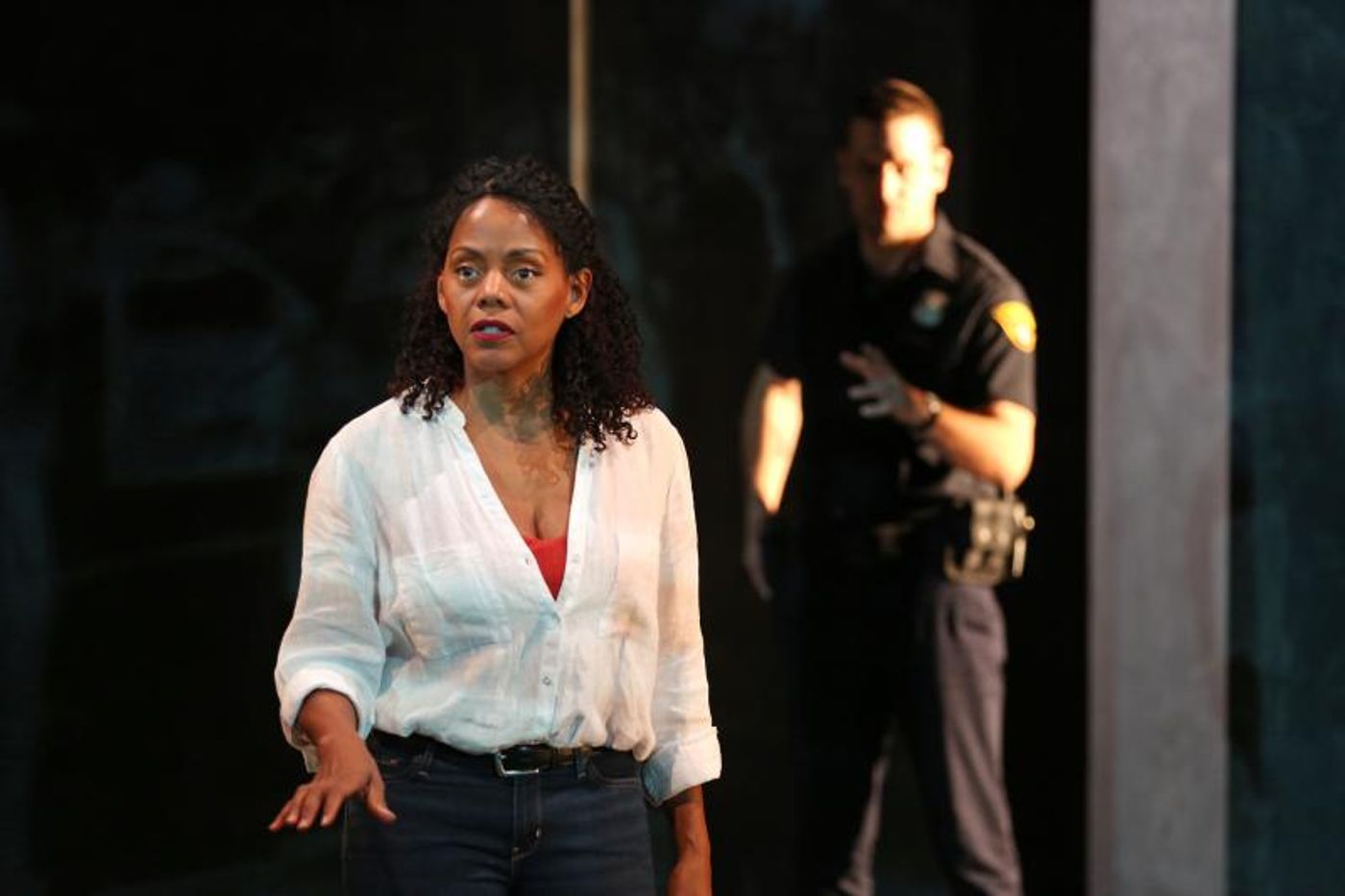
And when a shooting of a young man of color does occur, both Amina and Ryan are, as expected, thrown into a tailspin, threatening the stability of their already shaky relationship as well as their own respective careers on the police force. Ryan, the police officer who shot the young man, struggles to remember the facts of the event, while Amina is forced to look at Ryan with fresh eyes, reluctantly having to bring up tense issues she thought wasn't applicable to her progressive white boyfriend.
Their motivations, once one and the same, suddenly skew into separate tangents that seem impossible to reconnect towards the same path.
An engaging and very timely play, SHEEPDOG approaches its story with caution and careful introspection, not completely committing with stronger conviction for one side of the political divide than the other, but also not shying away from presenting the harsh reality of our world today. By confronting topics through the lens of a woman of color who happens to be both a police officer and in a committed relationship with a white man who is also a cop, this unique point of view allows audiences to see a scenario deeply from within---from a human being living out this nightmare.
Artigue's superb narrative is only as stirring as the people tasked to bring it to life, and in this beautifully-acted world premiere production, LaVonn and Coco are just excellent as two lovers (and professional partners) entangled in a relationship piled high with complications. As the only two actors seen on stage at any given time, LaVonn and Coco have believable chemistry in both directions---they are electric as a pair of lovers, and are visibly adversarial when on opposing sides of multiple issues---including the major one that forever changes their lives. (Melody Butiu and Ricardo Salinas provide the play's female and male voiceovers respectively for minor characters heard but not seen).
As Ryan, Coco admirably displays his character's ability to straddle the comfortable line between strong self-confidence while also being secure (or, perhaps, being good at pretending to be secure) in the presence of his partner's often immovable convictions. When his character is suddenly thrust into a tragic situation---shooting a young black man while in the line of duty---Coco makes a decisive shift that Ryan must now embody, allowing for a vulnerability that earns some empathy but also revealing a burgeoning volatility that earns understandable suspicion and fear.
LaVonn, however, takes up the lion share of stage time, seamlessly switching back and forth as both Amina and the play's own cautionary narrator---and the performance is mesmerizing to watch. Her many aching, fiercely-delivered monologues---both as the narrator shook by having to recap the events and as Amina, who is grappling with the events as they happen---keep the play in a brisk trajectory towards the story's big final reveal, as we hang on to every bit of information she dispels. LaVonn skillfully allows us to connect with both her character and her narrating alter ego---who seems to speak out as if trying to talk to Amina in an effort to make her see that every decision she makes is for the best.
While we can all certainly agree that being a cop is quite a stressful profession, no matter what background one comes from or no matter what precinct one is a part of, we also cannot deny that there is a pervading problem still happening in our country when it comes to law enforcement and their alleged bias against people of color, whether it be premeditated, subtle, or subconscious. Lives should not be cut short too soon all because of a rush-to-judgment, split-second decision that's unfortunately impossible to undo. SHEEPDOG tackles the subject with grace and open-mindedness and therefore makes it one of the most powerful and provocative new plays to come out this season.
* Follow this reviewer on Twitter: @cre8iveMLQ *
-----
Photos by Jordan Kubat for South Coast Repertory.
South Coast Repertory presents SHEEPDOG by Kevin Artigue. Directed by Leah C. Gardiner. Performances continue at South Coast Repertory through May 5, 2019. Tickets can be purchased online at www.scr.org, by phone at (714) 708-5555 or by visiting the box office at 655 Town Center Drive in Costa Mesa.
***
Reader Reviews
Videos


